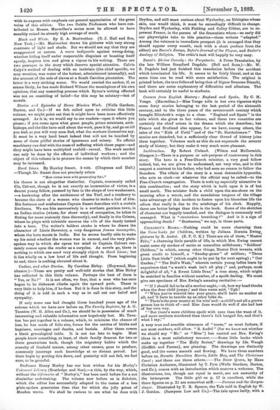Professor Henry Morley has our best wishes for his Morley's
.Universal Library (Routledge and Son),—a title, by the way, which, without the ciirTerentia of "Morley's," has been used before for a not dissimilar undertaking. The volume now before us is Rabelais, which the editor has successfully adapted to the tastes of a less plainspoken generation than that for which the jolly priest of Meudon wrote. We shall be curious to see what he does with Dryden, and still more curious about Wycherley, an Ethiopian whose skin, one would think, it must be exceedingly difficult to change. Dryden and Wycherley, with Fielding and Colley Gibber, are to re- present France, in the person of the dramatists whom—so early did our playwrights take to this practice—these writers "adapted." Among the volumes in immediate prospect (it is arranged that they should appear every month, each with a abort preface from the editor) are Bacon's Essays, Defoe's Journal of the Plague, and Butler's Analogy of Religion. The critic's task will happily be very easy.






































 Previous page
Previous page